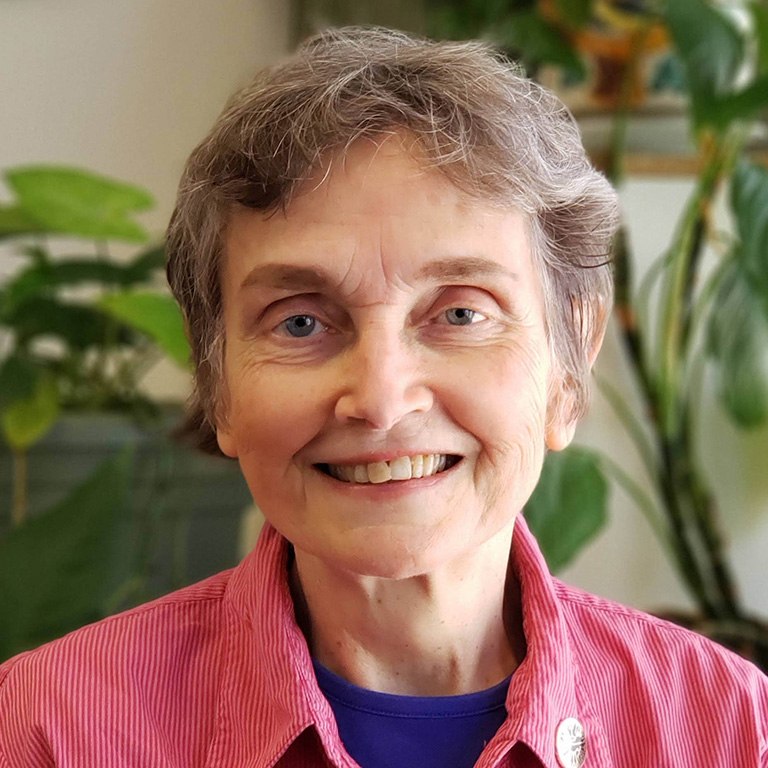- Ph.D., Indiana University, 1975
- M.A., Indiana University, 1973
- B.A., Manchester College, 1969

Sandra K. Dolby
Professor Emerita, Folklore

Professor Emerita, Folklore
Sandra K. (Sandy) Dolby retired from Indiana University after 35 years as an academic folklorist. In that time she has served the discipline in numerous ways, contributing especially to the pedagogy of folklore and folk narrative theory, while also making significant administrative and service contributions to Indiana University.
Sandy was born and grew up in Huntington, Indiana, where she had the pleasure of attending high school with future Vice President of the United States Dan Quayle. She took a B.A. in English, cum laude, from Manchester College, and after a brief spell teaching high school English, she returned to academe to take an M.A. and Ph.D. in folklore from Indiana University.
Sandy’s first academic position was at the University of Houston, but in 1979 she came back to her alma mater and the Department of Folklore, adding American studies to her portfolio in 1983. She has served as acting director of American studies (1994–1995) and as director of the Folklore Institute from 2007 to 2008. She was the recipient of a fellowship from the National Library of Australia that took her to the antipodes in 1985, where she was the keynote speaker at a conference on the professionalization of folklore research in that country. In 2001–2002 she was a Fulbright Roving Scholar of American Studies in Norway.
Sandy has the distinction of having introduced a new genre to the canon of folk narrative—the personal narrative. Personal narratives are stories that people tell based on their own experiences; however, Sandy’s research showed that such narratives are not completely idiosyncratic, but arise from a creative blend of the personal and the traditional. Her 1977 article, “The Personal Narrative as Folklore,” and her book, Literary Folkloristics and the Personal Narrative (1989; reprinted with a new preface, 2008), remain the seminal and oft‐cited works on the topic. In addition, Sandy has to her credit a book on self‐help books (Self‐Help Books: Why Americans Keep Reading Them), an edited collection of essays on the relations between folklore and literature, more than 30 articles and chapters, and more than 50 conference presentations on various aspects of American folk literature and folklore. She has also served as editor of the Journal of Folklore Research, one of the three leading journals in the field internationally.
In terms of teaching, Sandy’s achievements cannot be overestimated. She has devoted herself to mindful teaching in both folklore and American Studies, garnering two university teaching awards, participating in the highly successful Scholarship of Teaching and Learning (SOTL) initiative (and serving on the SOTL advisory committee for more than 10 years), and serving as co‐chair of the Bloomington Faculty Council’s Associate Instructor Affairs Committee. Within the folklore department she has spent more than 10 years as tireless director of undergraduate studies, and she introduced a popular advanced seminar on folklore pedagogy. These contributions all attest to Sandy’s conviction that mindful teaching is central to the university. Her skill as a teacher and mentor has made her a sought‐after dissertation director, as her resume shows: she had directed no fewer than 24 dissertations and served on 47 other dissertation committees. One of these dissertations was awarded the prestigious Chicago Folklore Prize when published as a book.
A surprising number of folklorists are performers as well as researchers, and Sandy is no exception. She has recorded a number of CDs of vocal music, some traditional and some of her own composition. When my cohort of folklore students celebrated the end of our qualifying exams, Sandy serenaded us with “You Are the Ones,” a beautiful song she wrote especially for us, instructing us to carry the torch of folklore study forward to the next generation. None of us will ever forget it.
Sandy’s retirement plans include looking forward to devoting more time to harmonizing with the Bloomington Chamber Singers and to her current research projects, one on her beloved Handel, and another on the adaptation of American folk legendry in pedagogic contexts. Her selfless integrity will be missed on campus, but we anticipate with pleasure the opportunity to hear more of her beautiful alto voice in recordings and in concerts.
-Moira Marsh